 |
| Gjøvik High School is not providing an enriching information environment, this doesn't prove good for the future of my region. Click on the image for a magnification. |
But what does this mean, in human terms? Countless studies have established that the rearing environment dramatically impacts brain growth in children. In 1994 the Carnegie Task Force issued a report warning that children raised in experientially poor environments suffer permanent setbacks as compared to those raised in richer, more enhanced environments. This was in line with the Head Start program begun several decades earlier in the US. Turning to philosophy and robotics gives us a new insight into what might be going on. In 1998, A. Clark and D. Chalmers proposed the “extended mind” concept, where the workings of our mind actually extend beyond the brain and into our surroundings. An interplay takes place between our thoughts and internal memories, and knowledge and information stored outside yet within ready reach. Mobile robots do, in fact, use their environment as their memory — they have no stored internal memory, and thus save enormous computational overhead. Rodney Brooks’ Mars Explorer works in precisely this way. Its ability to navigate its environment comes from an “intelligence” that links internal processors with external information. This implies that the environment is crucial to the development of our brain: our mind is an integral part of our environment, and if we wish it to engage our intelligence, the environment should embody the same degree of organized complexity as our neurological processes themselves. - Michael W. Mehaffy and Nikos A. Salingaros



No comments:
Post a Comment
Note: Only a member of this blog may post a comment.